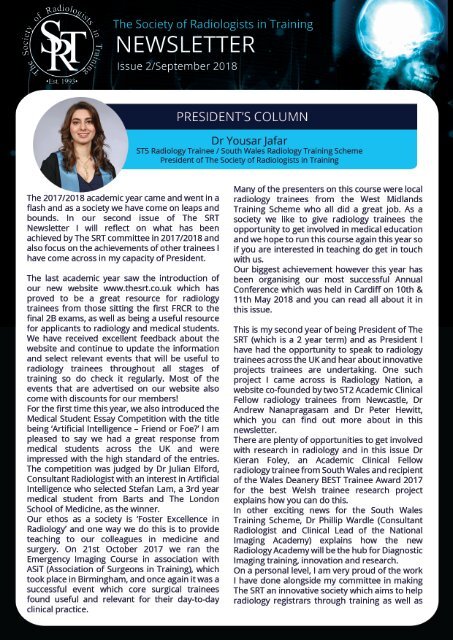Create successful ePaper yourself
Turn your PDF publications into a flip-book with our unique Google optimized e-Paper software.
Research in Radiology<br />
How you can get involved<br />
The clinical radiology department is at the heart of<br />
every hospital, with many specialities relying on<br />
medical imaging for patient management. As a<br />
result, radiology input is fundamental to many<br />
research studies, so there are plenty of<br />
opportunities for trainees.<br />
One route into academic radiology is to apply for<br />
an academic clinical fellowship (ACF) co-ordinatined<br />
by the National Institute for Health Research<br />
(NIHR), in which up to 25% of training is dedicated<br />
to research activity. The Welsh equivalent is the<br />
Welsh Clinical Academic Training (WCAT) fellowship<br />
(to which I’m extremely grateful because the<br />
fellowship provided funding for my PhD). These<br />
schemes provide trainees with support to develop<br />
their research careers.<br />
Involvement in research is a requirement of core<br />
training and is embedded in the Royal College of<br />
Radiologists curriculum, necessitating at least an<br />
understanding of its core principles. It is therefore<br />
a basic requirement that trainees engage in<br />
research in their respective deaneries. For many,<br />
there may be natural links to research activity in<br />
their respective departments. But some of you may<br />
be reading this and thinking “I don’t know anyone<br />
that does research in my department”. Not to<br />
worry, there are many resources that can help!<br />
My first recommendation is to visit the RCR<br />
website’s academic radiology section<br />
(https://www.rcr.ac.uk/clinical-radiology/academic-r<br />
adiology). The RCR academic committee have<br />
worked hard to bring this valuable resource<br />
together. This page hosts extremely useful<br />
information about research awards and<br />
fellowships, the annual RCR academic day and<br />
other pieces of advice and guidance. There is also a<br />
‘Research Map’<br />
(https://www.rcr.ac.uk/clinical-radiology/academic-r<br />
adiology-and-research/radiology-research-map)<br />
listing radiologists around the UK who are willing to<br />
help trainees with research projects, from simple<br />
advice to more active participation. An excellent list<br />
of electronic resources for research has been<br />
compiled by Dr Karen Eley<br />
(https://www.rcr.ac.uk/sites/default/files/e-Learning<br />
_Research_Resources.pdf).<br />
Dr Kieran Foley, an academic radiology registrar from South<br />
Wales, explains how you can get involved in research<br />
The world of research is extremely varied and means different things to<br />
different people. To many, just hearing the word ‘research’ triggers<br />
involuntary responses of fear, trepidation or boredom. To others, the<br />
prospect of setting up or joining an existing research study is exciting.<br />
Luckily, clinical radiology offers trainees a wealth of opportunities to<br />
participate in research.<br />
I would definitely recommend getting involved<br />
in research. There are many positive<br />
experiences available to trainees and I’ve<br />
thoroughly enjoyed my research career so far.<br />
Research provides key skills such as critical<br />
appraisal that are required in everyday clinical<br />
practice and that will benefit all aspects of<br />
your future career. You should consider the<br />
area of research that you would like to<br />
become involved in because you can spend<br />
many hours working in the field! My main<br />
piece of advice is to find a mentor, supervisor<br />
and/or research team who are willing to<br />
actively participate in your research project.<br />
As with most things, there will be hard work<br />
along the way, but the benefits are extremely<br />
rewarding! It is an exciting time to be involved<br />
in radiology research, especially with the<br />
emergence of artificial intelligence and other<br />
cutting-edge technologies. By getting involved<br />
in research, you have the chance to be at the<br />
forefront of modern medicine.


